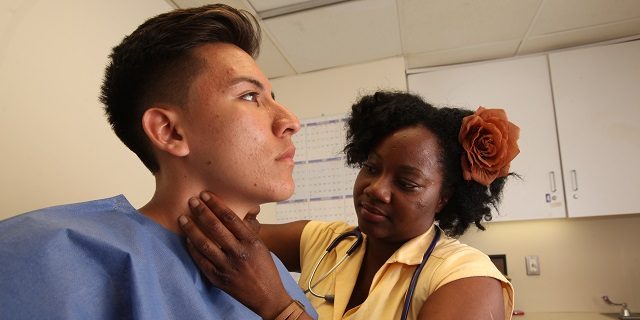
Adolescent health isn’t a particularly well-known specialty. Many people don’t even know it exists. So what exactly is an adolescent medicine specialist and why do people see them?
Why does adolescence need its own specialty?
The short answer is that adolescents (generally considered ages 10-24) are going through a lot of changes. Adolescence includes not only the physical changes of puberty—periods, wet dreams, growing into an adult body—but also social changes which are just as confusing and challenging. Young people are learning how to navigate relationships, plan for their future, think about family planning and more. They’re developing their identity and beliefs, and going from concrete to abstract thinking. This means accepting ambiguity and understanding that we all have our own unique moral codes.
Adolescent medicine specialists are trained to help young people through this challenging period as they become more independent.
What is adolescent medicine?
Adolescent health is a pediatrics subspecialty. Adolescent medicine specialists are (mostly) pediatricians who enjoy working with teens and young adults so much they want to specialize in that age group.
Adolescent medicine is one of only three age-based specialties. The other two are neonatology (very young infants) and gerontology (aging). These are all significant transition periods that are heavily influenced by the environment. Family and community have a major impact on the changes and outcomes of these periods.
This means that adolescent medicine specialists deal with a lot more than medicine. They’re concerned with their patients’ relationships, home life, emotional health and more. They’re interested in helping their patients learn how to make their own medical decisions, navigate the healthcare system, and build healthy habits. They’re also trained in how to effectively communicate with adolescents.
How is a visit with an adolescent medicine specialist different than with a pediatrician?
In adolescent health, there’s a focus on patient comfort. The environment is built for young people. They are in control. The offices themselves are often designed to be friendly and welcoming. Patients are encouraged to talk about whatever’s on their minds, no matter how embarrassing or taboo it may seem.
Adolescent health visits are slightly longer than normal wellness visits, clocking in at 30 minutes instead of the normal 15-20. This gives the patient and doctor plenty of time to talk and answer the patient’s questions. The visit is split into two parts: one with the parent present, and one with the patient alone. Sometimes, teens can be seen without their parents. This gives young people an opportunity to practice the skills they’ll need later in life: giving their own medical history, asking necessary questions, and more.
Often, patients are given a questionnaire at the beginning of visits with questions that ask about your whole life, not just your medical history. Adolescent medicine specialists want to get a feel for their patient’s whole life.
If a young person feels uncomfortable talking to their parents about something (like sex, relationships, emotions, or drugs), they can talk to an adolescent medicine specialist. We serve as an additional caring, responsible adult who can give advice. We can also connect patients with additional resources, like LGBTQ community centers, therapists and more.
Being nonjudgmental and treating all patients with respect is really important for adolescent medicine specialists. Teens often feel ignored or dismissed by the world, but in an adolescent health clinic, their thoughts and feelings matter.
Who should see an adolescent medicine specialist?
Some people see adolescent medicine specialists as their primary care provider, while others use them as specialists.
Anyone who feels like they might benefit from having a doctor-patient relationship like the one I’ve described would benefit from seeing an adolescent health specialist. But certain young people might benefit more than others, such as:
- Adolescents who have chronic medical needs. They’re beginning to plan for their future, deal with the fact that they physically can’t do everything their peers can, and think about dating and their sexual and reproductive health. It can feel odd to talk to someone who’s been treating your medical needs for many years about these new issues, so they may want to see an adolescent medicine specialist.
- Young parents. They can get care for themselves and their child(ren) under one roof, which means they don’t have to deal with navigating multiple doctor’s offices.
- Young people in difficult situations. These are young people who might be dealing with violence at home, substance abuse, mental illness, or other challenging circumstances.
- LGBTQ+ teens. Many adolescent health specialists have received additional training in LGBTQ+ care.
Some people see adolescent health specialists for specialty care. We can help people…
- …if puberty isn’t happening like it’s supposed to (for example, if it’s happening too quickly, not quickly enough, or out of order).
- …with reproductive and sexual health services like gynecological exams, sexually transmitted infection (STI) testing and treatment, birth control and more.
- …who have eating disorders.
- …with some non-surgical sports medicine services.
If you’re interested in seeing an adolescent health specialist, you can find one using the Society for Adolescent Health and Medicine’s directory. If you’re in NYC, you can make an appointment where I work at the Mount Sinai Adolescent Health Center. We are NYC’s largest provider of high-quality, free, comprehensive health and wellness services for young people.
Lonna Gordon, MD, PharmD is a pediatrician at Mount Sinai Adolescent Health Center who is fellowship trained in adolescent medicine. In addition to general adolescent care, Dr. Gordon sees obese adolescents who are interested in comprehensive medical and reproductive health care through a structured, multidisciplinary approach to weight loss.
The Mount Sinai Adolescent Health Center is located in New York City. It provides comprehensive, confidential, judgment free health care at no charge to over 10,000 young people every year. This column is not intended to provide medical advice, professional diagnosis, opinion, treatment or services to you or to any other individual, only general information for education purposes only.


